Obd2 Scanner Volkswagen tools are essential for diagnosing and maintaining your vehicle. CAR-TOOL.EDU.VN offers comprehensive information to help you choose the best scanner, ensuring you can quickly identify and address any issues. Selecting the right diagnostic tool for your Volkswagen involves considering factors like code reading capabilities, live data streaming, and vehicle-specific functions. Explore the benefits of using diagnostic equipment and car diagnostic tools to keep your Volkswagen running smoothly.
Contents
- 1. Understanding OBD2 Scanners for Volkswagen
- 1.1. What is an OBD2 Scanner?
- 1.2. Why Do You Need an OBD2 Scanner for Your Volkswagen?
- 1.3. Key Features to Look For in an OBD2 Scanner for Volkswagen
- 1.4. Understanding Volkswagen-Specific Codes
- 2. Top OBD2 Scanners for Volkswagen Vehicles
- 2.1. Ross-Tech VCDS: The Gold Standard
- 2.1.1. Key Features of Ross-Tech VCDS
- 2.1.2. Pros and Cons of Ross-Tech VCDS
- 2.1.3. User Reviews and Testimonials
- 2.2. OBDEleven: A Powerful Alternative
- 2.2.1. Key Features of OBDEleven
- 2.2.2. Pros and Cons of OBDEleven
- 2.2.3. User Reviews and Testimonials
- 2.3. BlueDriver Pro: Bluetooth Convenience
- 2.3.1. Key Features of BlueDriver Pro
- 2.3.2. Pros and Cons of BlueDriver Pro
- 2.3.3. User Reviews and Testimonials
- 2.4. Autel AutoLink AL329: Budget-Friendly Option
- 2.4.1. Key Features of Autel AutoLink AL329
- 2.4.2. Pros and Cons of Autel AutoLink AL329
- 2.4.3. User Reviews and Testimonials
- 2.5. ScanGauge II: Real-Time Gauges and More
- 2.5.1. Key Features of ScanGauge II
- 2.5.2. Pros and Cons of ScanGauge II
- 2.5.3. User Reviews and Testimonials
- 3. How to Use an OBD2 Scanner on Your Volkswagen
- 3.1. Locating the OBD2 Port
- 3.2. Connecting the Scanner
- 3.3. Reading Diagnostic Trouble Codes (DTCs)
- 3.4. Interpreting the Codes
- 3.5. Clearing the Codes (Use with Caution)
- 4. Advanced Diagnostic Techniques for Volkswagen
- 4.1. Live Data Analysis
- 4.2. Freeze Frame Data Analysis
- 4.3. Actuator Tests
- 4.4. Using Volkswagen-Specific Diagnostic Software
- 5. Maintaining Your Volkswagen with an OBD2 Scanner
- 5.1. Regular Check-Ups
- 5.2. Monitoring Key Parameters
- 5.3. Addressing Issues Promptly
- 6. Where to Buy OBD2 Scanners for Volkswagen
- 6.1. Online Retailers
- 6.2. Automotive Parts Stores
- 6.3. Direct from Manufacturers
- 7. Common Volkswagen Problems and How an OBD2 Scanner Can Help
- 7.1. Misfires
- 7.2. Oxygen Sensor Issues
- 7.3. Catalytic Converter Problems
- 7.4. Mass Airflow (MAF) Sensor Issues
- 7.5. Evaporative Emission Control System (EVAP) Problems
- 8. OBD2 Scanner Comparison Table for Volkswagen
- 9. FAQ About OBD2 Scanners for Volkswagen
- 9.1. What is the best OBD2 scanner for a Volkswagen?
- 9.2. Can I use any OBD2 scanner on my Volkswagen?
- 9.3. How do I reset the check engine light on my Volkswagen?
- 9.4. What do I do if my OBD2 scanner is not working on my Volkswagen?
- 9.5. How often should I use an OBD2 scanner on my Volkswagen?
- 9.6. Are there any free OBD2 scanner apps for Volkswagen?
- 9.7. Can an OBD2 scanner help me improve my Volkswagen’s fuel economy?
- 9.8. Can an OBD2 scanner help me diagnose ABS or airbag problems on my Volkswagen?
- 9.9. Where can I find a list of OBD2 codes for Volkswagen?
- 9.10. Is it safe to drive my Volkswagen with the check engine light on?
- 10. Conclusion: Choosing the Right OBD2 Scanner for Your Volkswagen
1. Understanding OBD2 Scanners for Volkswagen
1.1. What is an OBD2 Scanner?
An OBD2 scanner is a diagnostic tool that accesses a vehicle’s On-Board Diagnostic system (OBD). Since 1996, all vehicles sold in the United States have been equipped with OBD2 systems to monitor engine performance and emissions. According to the Environmental Protection Agency (EPA), OBD2 systems help ensure vehicles meet emissions standards. An OBD2 scanner reads diagnostic trouble codes (DTCs) stored in the vehicle’s computer, providing insights into potential issues. These tools range from basic code readers to advanced devices that offer live data, freeze frame information, and bi-directional control.
1.2. Why Do You Need an OBD2 Scanner for Your Volkswagen?
Having an OBD2 scanner for your Volkswagen can save time and money by allowing you to diagnose problems yourself. Instead of relying solely on a mechanic, you can identify the issue and decide on the best course of action. A study by AAA found that vehicle owners who perform regular maintenance can save an average of $1,200 per year in repair costs. OBD2 scanners empower you to perform preventative maintenance and address minor issues before they escalate into major repairs.
1.3. Key Features to Look For in an OBD2 Scanner for Volkswagen
When choosing an OBD2 scanner for your Volkswagen, consider the following features:
- Compatibility: Ensure the scanner supports the OBD2 protocol and is compatible with your Volkswagen model year.
- Code Reading and Clearing: The scanner should be able to read and clear both generic and manufacturer-specific diagnostic trouble codes (DTCs).
- Live Data Streaming: Look for a scanner that provides real-time data from various sensors, such as engine temperature, RPM, and oxygen sensor readings.
- Freeze Frame Data: This feature captures a snapshot of sensor data when a DTC is triggered, helping you understand the conditions that caused the problem.
- Bi-Directional Control: Advanced scanners offer bi-directional control, allowing you to send commands to vehicle systems to test their functionality.
- User Interface: A user-friendly interface with a clear display and intuitive navigation is essential for ease of use.
- Update Capability: Ensure the scanner can be updated with the latest software and vehicle data to maintain accuracy and compatibility.
1.4. Understanding Volkswagen-Specific Codes
Volkswagen vehicles have unique diagnostic codes beyond the standard OBD2 codes. These manufacturer-specific codes provide more detailed information about issues related to VW’s systems. A scanner that can read these codes is invaluable for accurate diagnosis. According to a report by Bosch, manufacturer-specific codes can reduce diagnostic time by up to 50%.
2. Top OBD2 Scanners for Volkswagen Vehicles
2.1. Ross-Tech VCDS: The Gold Standard
The Ross-Tech VCDS (VAG-COM Diagnostic System) is widely regarded as the gold standard for Volkswagen diagnostic tools. It is specifically designed for Volkswagen Group vehicles, including Audi, Skoda, and SEAT.
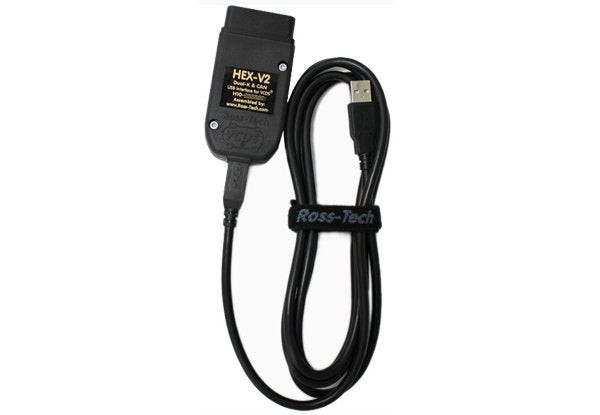 Ross-Tech VCDS diagnostic interface with laptop showing diagnostic data
Ross-Tech VCDS diagnostic interface with laptop showing diagnostic data
2.1.1. Key Features of Ross-Tech VCDS
- Comprehensive Diagnostics: Reads and clears diagnostic trouble codes (DTCs) from all modules in the vehicle.
- Live Data Monitoring: Displays real-time data from sensors and components, allowing you to monitor performance and identify issues.
- Advanced Coding and Adaptation: Enables you to perform advanced coding and adaptation functions, such as enabling or disabling features, adjusting settings, and programming new modules.
- Actuator Tests: Allows you to activate and test individual components, such as fuel injectors, solenoids, and relays.
- Data Logging: Records data from multiple sensors simultaneously for later analysis.
- Regular Updates: Ross-Tech provides regular software updates to ensure compatibility with the latest Volkswagen models.
2.1.2. Pros and Cons of Ross-Tech VCDS
| Pros | Cons |
|---|---|
| Specifically designed for Volkswagen Group vehicles | Higher price point compared to generic OBD2 scanners |
| Comprehensive diagnostic capabilities | Steeper learning curve for beginners |
| Advanced coding and adaptation functions | Requires a Windows-based laptop for operation |
| Regular software updates |
2.1.3. User Reviews and Testimonials
Many Volkswagen owners and mechanics praise the Ross-Tech VCDS for its comprehensive capabilities and accuracy. Users report that it provides detailed information and allows them to perform advanced functions that are not possible with generic OBD2 scanners.
2.2. OBDEleven: A Powerful Alternative
OBDEleven is another popular choice for Volkswagen diagnostics, offering a combination of affordability and functionality. It uses a Bluetooth dongle that connects to your smartphone or tablet, allowing you to perform diagnostics and coding using a mobile app.
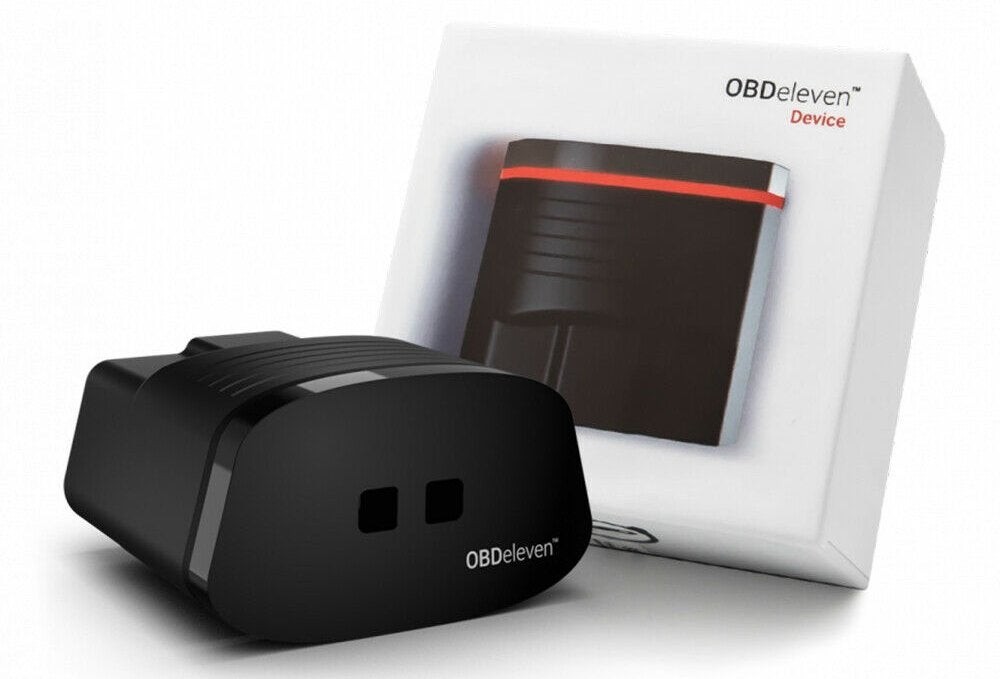 OBDEleven Pro diagnostic tool connected to a smartphone
OBDEleven Pro diagnostic tool connected to a smartphone
2.2.1. Key Features of OBDEleven
- Vehicle-Specific Diagnostics: Reads and clears diagnostic trouble codes (DTCs) from all modules in the vehicle.
- Live Data Monitoring: Displays real-time data from sensors and components.
- One-Click Apps: Offers pre-programmed coding options for various functions, such as enabling comfort features, adjusting lighting settings, and more.
- Coding and Adaptation: Allows you to perform manual coding and adaptation functions.
- History and Statistics: Stores diagnostic history and provides statistics on vehicle usage.
2.2.2. Pros and Cons of OBDEleven
| Pros | Cons |
|---|---|
| Affordable price point | Requires a smartphone or tablet for operation |
| User-friendly mobile app | One-click apps require credits, which must be purchased |
| Vehicle-specific diagnostics | Limited functionality compared to Ross-Tech VCDS |
| Wireless Bluetooth connectivity |
2.2.3. User Reviews and Testimonials
OBDEleven is praised for its ease of use and affordable price. Many users find the one-click apps convenient for performing common coding tasks. However, some users note that the credit system for one-click apps can be costly over time.
2.3. BlueDriver Pro: Bluetooth Convenience
BlueDriver Pro is a Bluetooth OBD2 scanner that connects to your smartphone or tablet. It offers a range of diagnostic features and is compatible with a wide range of vehicles, including Volkswagen.
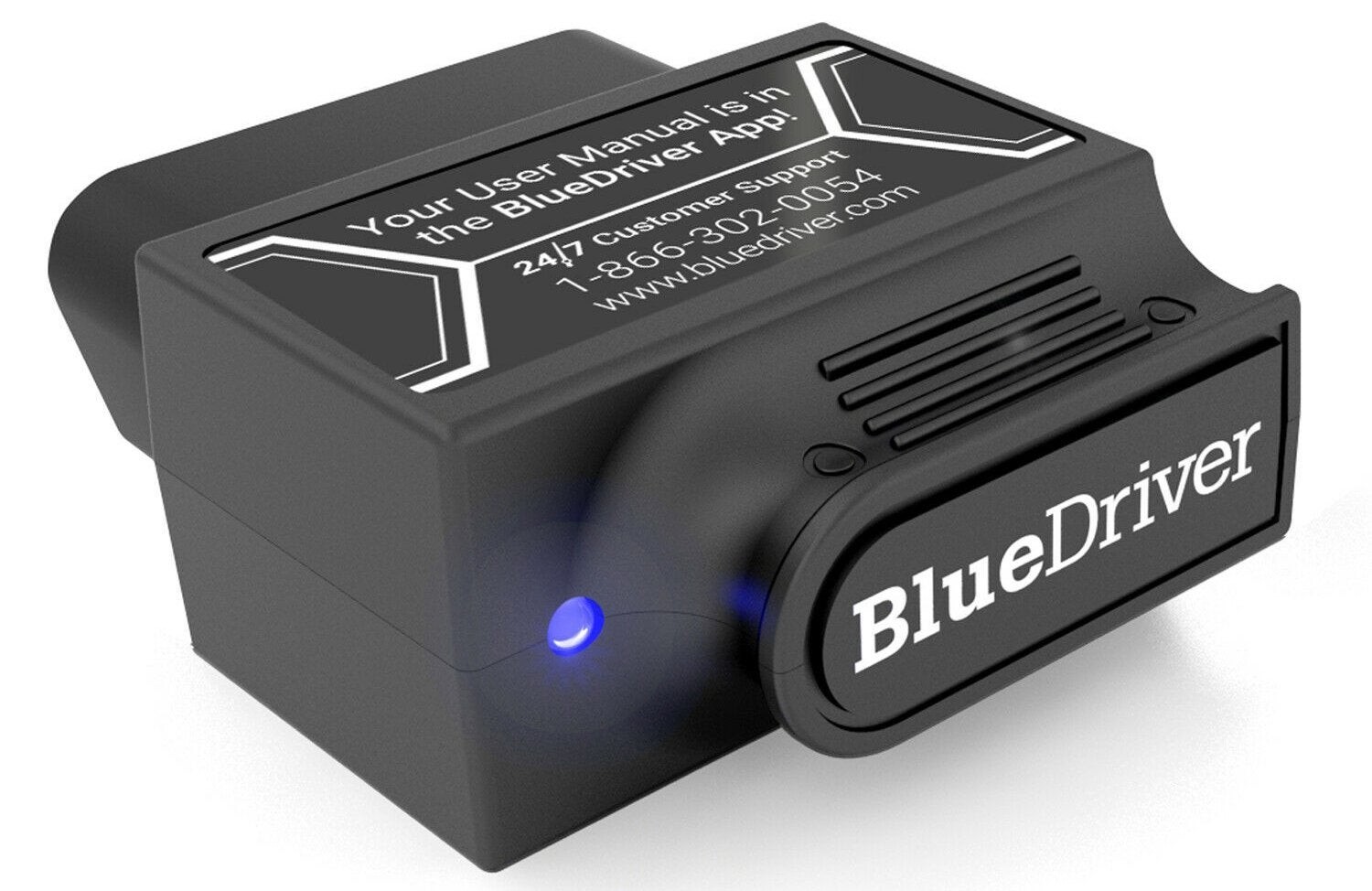 BlueDriver Pro Bluetooth OBD2 scanner with smartphone app
BlueDriver Pro Bluetooth OBD2 scanner with smartphone app
2.3.1. Key Features of BlueDriver Pro
- Full System Scan: Scans all modules in the vehicle for diagnostic trouble codes (DTCs).
- Live Data Monitoring: Displays real-time data from sensors and components.
- Repair Reports: Provides detailed repair reports with likely causes, fixes, and tips for specific DTCs.
- Freeze Frame Data: Captures a snapshot of sensor data when a DTC is triggered.
- Smog Check Readiness: Indicates whether the vehicle is ready for a smog check.
2.3.2. Pros and Cons of BlueDriver Pro
| Pros | Cons |
|---|---|
| Wireless Bluetooth connectivity | Requires a smartphone or tablet for operation |
| Comprehensive repair reports | Limited coding and adaptation functions |
| Wide vehicle compatibility |
2.3.3. User Reviews and Testimonials
BlueDriver Pro is praised for its user-friendly app and comprehensive repair reports. Users find the repair reports particularly helpful for diagnosing and fixing issues.
2.4. Autel AutoLink AL329: Budget-Friendly Option
The Autel AutoLink AL329 is a basic OBD2 scanner that offers essential diagnostic functions at an affordable price. It is a standalone tool with a color display, making it easy to read diagnostic trouble codes (DTCs) and view freeze frame data.
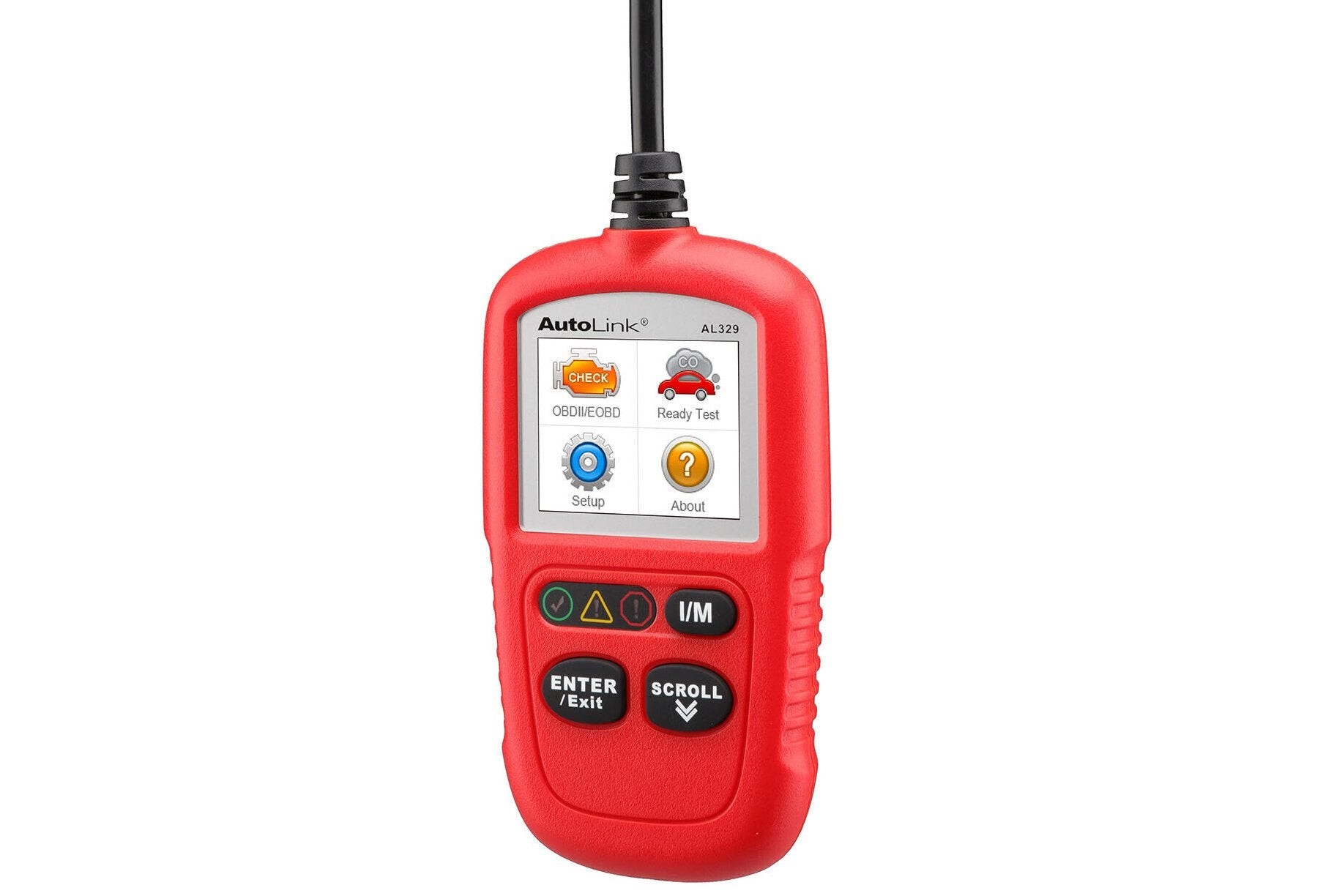 Autel AutoLink AL329 OBD2 scanner with color display
Autel AutoLink AL329 OBD2 scanner with color display
2.4.1. Key Features of Autel AutoLink AL329
- Reads and Clears DTCs: Reads and clears diagnostic trouble codes (DTCs) from the engine control unit (ECU).
- Freeze Frame Data: Displays freeze frame data to help diagnose issues.
- Emissions Readiness: Indicates whether the vehicle is ready for an emissions test.
- Color Display: Features a color display for easy reading.
2.4.2. Pros and Cons of Autel AutoLink AL329
| Pros | Cons |
|---|---|
| Affordable price point | Limited functionality compared to advanced scanners |
| Standalone tool, no smartphone required | No live data monitoring |
| Easy to use |
2.4.3. User Reviews and Testimonials
The Autel AutoLink AL329 is praised for its affordability and ease of use. It is a good option for basic diagnostics and clearing trouble codes.
2.5. ScanGauge II: Real-Time Gauges and More
The ScanGauge II is a unique OBD2 scanner that doubles as a real-time gauge display. It can display a variety of vehicle parameters, such as RPM, speed, coolant temperature, and fuel economy.
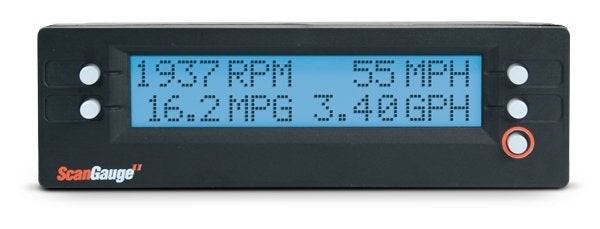 ScanGauge II OBD2 scanner displaying real-time vehicle data
ScanGauge II OBD2 scanner displaying real-time vehicle data
2.5.1. Key Features of ScanGauge II
- Real-Time Gauges: Displays real-time data from various sensors and components.
- Trip Computer: Calculates fuel economy, distance traveled, and other trip-related data.
- Diagnostic Trouble Codes: Reads and clears diagnostic trouble codes (DTCs).
- Customizable Display: Allows you to customize the display to show the parameters you want to monitor.
2.5.2. Pros and Cons of ScanGauge II
| Pros | Cons |
|---|---|
| Real-time gauge display | Limited diagnostic functionality compared to advanced scanners |
| Trip computer functions |
2.5.3. User Reviews and Testimonials
The ScanGauge II is praised for its real-time gauge display and trip computer functions. It is a good option for monitoring vehicle performance and fuel economy.
3. How to Use an OBD2 Scanner on Your Volkswagen
3.1. Locating the OBD2 Port
The OBD2 port is typically located under the dashboard on the driver’s side. It is a 16-pin connector that provides access to the vehicle’s diagnostic system.
3.2. Connecting the Scanner
Plug the OBD2 scanner into the port. Turn the ignition key to the “on” position, but do not start the engine. The scanner should power on and display a menu.
3.3. Reading Diagnostic Trouble Codes (DTCs)
Select the “Read Codes” or “Diagnostic Codes” option from the scanner’s menu. The scanner will display any stored diagnostic trouble codes (DTCs). Record the codes for further research.
3.4. Interpreting the Codes
Each DTC corresponds to a specific problem or fault in the vehicle’s system. Use the scanner’s manual or an online resource to look up the meaning of each code. Resources like the National Institute for Automotive Service Excellence (ASE) provide extensive information on DTCs.
3.5. Clearing the Codes (Use with Caution)
After diagnosing and repairing the issue, you can clear the codes using the scanner’s “Clear Codes” or “Erase Codes” option. Be cautious when clearing codes, as this will also reset the vehicle’s readiness monitors. Make sure the vehicle has completed all necessary drive cycles before having it inspected for emissions.
4. Advanced Diagnostic Techniques for Volkswagen
4.1. Live Data Analysis
Live data analysis involves monitoring real-time data from various sensors and components while the engine is running. This can help you identify intermittent problems or performance issues that may not trigger a DTC.
4.2. Freeze Frame Data Analysis
Freeze frame data captures a snapshot of sensor data when a DTC is triggered. This can provide valuable information about the conditions that caused the problem.
4.3. Actuator Tests
Actuator tests allow you to activate and test individual components, such as fuel injectors, solenoids, and relays. This can help you determine whether a component is functioning properly.
4.4. Using Volkswagen-Specific Diagnostic Software
For advanced diagnostics, consider using Volkswagen-specific diagnostic software, such as Ross-Tech VCDS or OBDEleven. These tools offer comprehensive diagnostic capabilities and allow you to perform advanced coding and adaptation functions.
5. Maintaining Your Volkswagen with an OBD2 Scanner
5.1. Regular Check-Ups
Perform regular check-ups with your OBD2 scanner to identify potential issues early. This can help you prevent costly repairs and keep your Volkswagen running smoothly.
5.2. Monitoring Key Parameters
Monitor key parameters, such as engine temperature, fuel economy, and emissions readiness, to ensure your Volkswagen is performing optimally.
5.3. Addressing Issues Promptly
Address any issues identified by the OBD2 scanner promptly. Ignoring problems can lead to further damage and more expensive repairs.
6. Where to Buy OBD2 Scanners for Volkswagen
6.1. Online Retailers
Online retailers, such as Amazon and eBay, offer a wide selection of OBD2 scanners for Volkswagen. Be sure to read customer reviews and compare prices before making a purchase.
6.2. Automotive Parts Stores
Automotive parts stores, such as AutoZone and Advance Auto Parts, also sell OBD2 scanners. These stores often have knowledgeable staff who can help you choose the right scanner for your needs.
6.3. Direct from Manufacturers
You can also purchase OBD2 scanners directly from manufacturers, such as Ross-Tech and Autel. This can ensure you are getting a genuine product with the latest software updates.
7. Common Volkswagen Problems and How an OBD2 Scanner Can Help
7.1. Misfires
Misfires can be caused by a variety of factors, such as faulty spark plugs, ignition coils, or fuel injectors. An OBD2 scanner can help you identify which cylinder is misfiring, allowing you to focus your troubleshooting efforts.
7.2. Oxygen Sensor Issues
Oxygen sensors monitor the amount of oxygen in the exhaust gas. Faulty oxygen sensors can cause poor fuel economy and emissions problems. An OBD2 scanner can help you diagnose oxygen sensor issues and determine whether they need to be replaced.
7.3. Catalytic Converter Problems
The catalytic converter reduces harmful emissions from the exhaust gas. Catalytic converter problems can cause the engine to run poorly and fail emissions tests. An OBD2 scanner can help you diagnose catalytic converter issues and determine whether it needs to be replaced.
7.4. Mass Airflow (MAF) Sensor Issues
The mass airflow (MAF) sensor measures the amount of air entering the engine. Faulty MAF sensors can cause poor fuel economy, rough running, and stalling. An OBD2 scanner can help you diagnose MAF sensor issues and determine whether it needs to be replaced.
7.5. Evaporative Emission Control System (EVAP) Problems
The evaporative emission control system (EVAP) prevents fuel vapors from escaping into the atmosphere. EVAP problems can cause fuel odors and emissions problems. An OBD2 scanner can help you diagnose EVAP issues and determine which components need to be replaced.
8. OBD2 Scanner Comparison Table for Volkswagen
| Feature | Ross-Tech VCDS | OBDEleven | BlueDriver Pro | Autel AutoLink AL329 | ScanGauge II |
|---|---|---|---|---|---|
| Vehicle Compatibility | VW Group | VW Group | Wide | Wide | Wide |
| Code Reading | Comprehensive | Extensive | Standard | Basic | Standard |
| Live Data | Yes | Yes | Yes | No | Yes |
| Bi-Directional Control | Yes | Limited | No | No | No |
| User Interface | Windows-based | Mobile App | Mobile App | Standalone | Standalone |
| Price | High | Moderate | Moderate | Low | Moderate |
9. FAQ About OBD2 Scanners for Volkswagen
9.1. What is the best OBD2 scanner for a Volkswagen?
The best OBD2 scanner for a Volkswagen depends on your needs and budget. For comprehensive diagnostics and advanced coding, the Ross-Tech VCDS is the gold standard. OBDEleven offers a more affordable option with a user-friendly mobile app. BlueDriver Pro provides comprehensive repair reports. The Autel AutoLink AL329 is a budget-friendly option for basic diagnostics. The ScanGauge II doubles as a real-time gauge display.
9.2. Can I use any OBD2 scanner on my Volkswagen?
While most OBD2 scanners will work on your Volkswagen, some scanners are better suited for VW vehicles than others. Scanners that support Volkswagen-specific diagnostic codes and functions will provide more detailed information and allow you to perform advanced tasks.
9.3. How do I reset the check engine light on my Volkswagen?
To reset the check engine light on your Volkswagen, connect an OBD2 scanner to the OBD2 port and select the “Clear Codes” or “Erase Codes” option. This will clear any stored diagnostic trouble codes (DTCs) and turn off the check engine light.
9.4. What do I do if my OBD2 scanner is not working on my Volkswagen?
If your OBD2 scanner is not working on your Volkswagen, try the following:
- Ensure the scanner is properly connected to the OBD2 port.
- Turn the ignition key to the “on” position, but do not start the engine.
- Check the scanner’s manual for troubleshooting tips.
- Try a different OBD2 scanner to rule out a problem with the scanner itself.
- Consult a qualified mechanic for assistance.
9.5. How often should I use an OBD2 scanner on my Volkswagen?
You should use an OBD2 scanner on your Volkswagen whenever the check engine light comes on or if you notice any unusual symptoms, such as poor fuel economy, rough running, or stalling. Regular check-ups with an OBD2 scanner can help you identify potential issues early and prevent costly repairs.
9.6. Are there any free OBD2 scanner apps for Volkswagen?
There are some free OBD2 scanner apps available for smartphones and tablets. However, these apps typically offer limited functionality and may not support Volkswagen-specific diagnostic codes. For more comprehensive diagnostics, consider using a dedicated OBD2 scanner or a paid app with advanced features.
9.7. Can an OBD2 scanner help me improve my Volkswagen’s fuel economy?
Yes, an OBD2 scanner can help you improve your Volkswagen’s fuel economy by identifying issues that may be affecting fuel consumption, such as faulty oxygen sensors, MAF sensors, or spark plugs. By addressing these issues, you can restore your Volkswagen’s fuel economy to its optimal level.
9.8. Can an OBD2 scanner help me diagnose ABS or airbag problems on my Volkswagen?
Some advanced OBD2 scanners can diagnose ABS (anti-lock braking system) and airbag problems on your Volkswagen. However, basic OBD2 scanners typically only read engine-related codes. For ABS and airbag diagnostics, you may need a scanner with more advanced capabilities or Volkswagen-specific diagnostic software.
9.9. Where can I find a list of OBD2 codes for Volkswagen?
You can find a list of OBD2 codes for Volkswagen in the scanner’s manual or online. Websites like OBD-Codes.com and Ross-Tech Wiki provide comprehensive information on OBD2 codes for Volkswagen and other vehicles.
9.10. Is it safe to drive my Volkswagen with the check engine light on?
It is generally not safe to drive your Volkswagen with the check engine light on, as this indicates that there is a problem with the vehicle’s system. While some problems may be minor, others can be serious and could potentially damage the engine or other components. It is best to have the problem diagnosed and repaired as soon as possible.
10. Conclusion: Choosing the Right OBD2 Scanner for Your Volkswagen
Selecting the right OBD2 scanner for your Volkswagen depends on your specific needs and budget. Whether you’re a professional mechanic or a DIY enthusiast, having a reliable diagnostic tool is essential for maintaining your vehicle and addressing issues promptly. The Ross-Tech VCDS remains the gold standard for comprehensive Volkswagen diagnostics, while options like OBDEleven and BlueDriver Pro offer excellent alternatives with user-friendly interfaces. For basic diagnostics, the Autel AutoLink AL329 provides an affordable solution, and the ScanGauge II offers real-time monitoring of vehicle parameters.
By understanding the features and benefits of each scanner, you can make an informed decision and invest in a tool that will help you keep your Volkswagen running smoothly for years to come. For further assistance and expert advice on choosing the best OBD2 scanner and car maintenance tools, contact CAR-TOOL.EDU.VN at 456 Elm Street, Dallas, TX 75201, United States, or reach us via Whatsapp at +1 (641) 206-8880. Visit our website CAR-TOOL.EDU.VN for more information and to explore our extensive range of automotive tools and accessories. Don’t wait—empower yourself with the right tools and knowledge today.